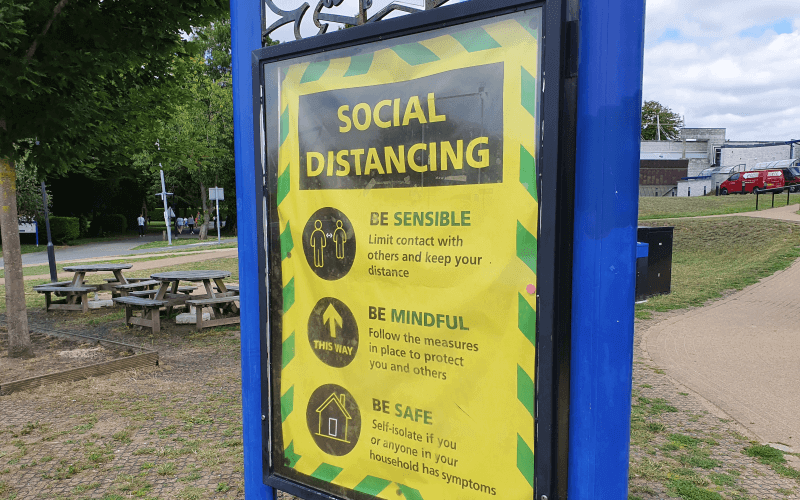Only three-fifths of council areas have a care setting that has been approved to receive hospital patients infected with COVID-19, despite ministers demanding every one of them should have at least one such setting by the end of October.
The Department of Health and Social Care (DHSC) told local authorities in the autumn that it wanted each of them to have access to “at least one CQC designated accommodation” by the end of October.
But the Care Quality Commission (CQC) released figures this month which showed that, on 8 December, just 90 of 151 local authority areas in England had at least one “designated setting” for patients who are well enough to be discharged from hospital, but are still infected with coronavirus.
Some local authorities will now be forced to share a designated setting located within another council area.
CQC and DHSC have failed this week to say how many of the settings “designated” by the care watchdog are in care homes which have “separate zoned accommodation and staffing” for service-users with coronavirus, and other parts occupied by residents who have not been infected.
DHSC made it clear in October – with CQC backing – that designated settings could be either “stand-alone units”, where only service-users with coronavirus would be admitted, or care homes with separate zoned accommodation and staffing.
This policy has been described as “abhorrent” by disabled activists, because it risks repeating the outcome of the scandal that occurred early in the pandemic, when hospital patients were discharged into care homes without being tested for COVID-19.
That government failing was believed to have caused the loss of thousands of lives.
DHSC and CQC have also failed this week to identify which individual care settings have been approved by CQC as designated settings, and which of them are offering zoned accommodation and staffing.
The CQC figures show that, in London, just 14 of 33 local authority areas had an approved designated setting on 8 December.
In the north-west, 14 of 23 local areas had an approved setting, and in the south-east just eight of 19 areas.
In the south-west there were only seven of 15 and in the West Midlands eight of 14 local authority areas.
Across the whole of the south-west of England, there were just 110 beds available in approved settings – including “alternative settings” provided by local NHS partners – for patients being discharged from hospital with COVID-19.
In all, across the whole of England, there are just 2,194 beds approved by CQC, or provided in alternative NHS settings, that are available for patients infected with COVID who have been discharged from hospital.
CQC says reasons for areas having different levels of designated settings include “the location being unsuitable, the location not being ready and staffing issues”.
It adds: “We’re in discussion with the Department of Health and Social Care, and system partners to address issues of capacity across [the] country, particularly in areas where there is a shortage or lack of designated settings.”
DHSC has previously refused to say why it does not ensure that all COVID-positive patients are discharged from hospital into well-resourced facilities that are only used for people already infected with the virus.
Despite being approached more than two days ago, DHSC had not responded to questions about the figures by noon today (Wednesday).
CQC refused to comment on how many local authorities still did not have an approved designated setting.
Asked how many of the approved settings were “zoned” accommodation, CQC said the watchdog does “not break down designated settings into zoned/standalone settings”.
Meanwhile, DHSC has released new guidance for those who are “clinically extremely vulnerable” to COVID-19 and live in London, the south-east and the east of England after these areas were moved into the new “tier four” set of restrictions.
They are now being “strongly advised” to stay at home at all times, except for exercise or medical appointments, and not to attend work, even if they cannot work from home.
The guidance is the same as that which was in place during the national lockdown in November.
DHSC said it would ensure that support was available for those who need it, such as “access to food and medicines and signposting to local support or befriending services”.
Letters will be sent to all those affected by these new shielding rules this week, although they “may take slightly longer than usual to arrive due to the Christmas period”, while the letters will be sent by email to those who have registered an email address with their GP.
*For sources of information and support during the coronavirus crisis, visit the DNS advice and information page
A note from the editor:
Please consider making a voluntary financial contribution to support the work of DNS and allow it to continue producing independent, carefully-researched news stories that focus on the lives and rights of disabled people and their user-led organisations.
Please do not contribute if you cannot afford to do so, and please note that DNS is not a charity. It is run and owned by disabled journalist John Pring and has been from its launch in April 2009.
Thank you for anything you can do to support the work of DNS…

 Government ignores access in £6 billion housing scheme
Government ignores access in £6 billion housing scheme Report warned of ‘catastrophic deterioration’ in some disabled people, but ministers still shelved power-cut action
Report warned of ‘catastrophic deterioration’ in some disabled people, but ministers still shelved power-cut action Government could be forced into further delays to social care charging reforms, senior civil servant suggests
Government could be forced into further delays to social care charging reforms, senior civil servant suggests